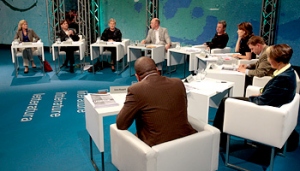 Karsten Krampitz (Bild: ORF/Johannes Puch)
Karsten Krampitz (Bild: ORF/Johannes Puch)
Criticism of the text, praise for the speech
Karsten Krampitz entered the competition with ‘Heimgehen’ (Going home). His novella excerpt raised the question of how texts with an open end should be judged in Klagenfurt: according to what there is, or according to what might yet come?
A good film based on a mediocre script
‘For me, reading the text and hearing it is difficult to bring in line’ said Alain Claude Sulzer first of all. At first, the text ‘was not of any great interest’ to him - now one can see, however, that a good director can turn even a mediocre script into a good film. ‘Role prose that captivates for a while’, said Sulzer.
Then Meike Feßmann said that she, too, liked this ‘martyr and snitch story’ at first; in the end, however, it falls victim to its self-imposed ‘simple means’.
 Jury (Bild: ORF/Johannes Puch)
Jury (Bild: ORF/Johannes Puch)
The text did not come across very well
According to Paul Jandl, Krampitz` text lacked ‘contour’, one doesn’t know in which direction this biography is going to develop. He can’t see the character as a political person - and that’s precisely what would have been of interest to him.
Karin Fleischanderl found the ‘mood’ of the text ‘respectable and German through and through’, a mood from which the author did not distance himself. Everything, she believed, pointed to the unravelling of the story at the end.
 Karin Fleischanderl (Bild: ORF/Johannes Puch)
Karin Fleischanderl (Bild: ORF/Johannes Puch)
Unanimous agreement among the jury : ‘The speech was excellent’
Ijoma Mangold tried to diffuse the rather harsh criticism levelled by her colleagues and said ‘I get the impression that the text does so badly because the reading was so excellent’.
Well-known problems with excerpts
Burkhard Spinnen then addressed the old Klagenfurt problem of the ‘excerpt’. The novella offers a certain ‘preview’, which should not however be the topic of discussion. It is difficult to place the character of the protagonist, even though interesting contours are emerging for later on: ‘I feel as if each one of my legs is in a little canoe and very slowly I am doing the splits’, said Spinnen.
 Burkhard Spinnen, Karsten Krampitz (Bild: ORF/Johannes Puch)
Burkhard Spinnen, Karsten Krampitz (Bild: ORF/Johannes Puch)
Hildegard Elisabeth Keller thanked Spinnen for the ‘basic clarification’ regarding the problem of the excerpt and then proposed that perhaps the intra-German dialectal experience contributed to Spinnen’s feeling of ‘doing the splits’ when he listened to the speech. She herself was fascinated by the ‘introduction in the style of a mystery story’, and the emotional and matter-of-fact proximity of this story, ‘written from the inside’, convinced her.
Murmured outrage from the audience
Finally, the author raised his hand and said, ‘The Stasi motif is only a hook on which to hang the story’. ‘Then the text is too harmless’, was Meike Feßmann’s response. The audience thought that the negative criticism went too far and the sound of murmured outrage could be heard in the ORF theatre.
Finally, presenter Clarissa Stadler said that she liked this discussion, everyone talks at the same time and even the audience butts in. ‘A positive development in the 33rd year of the competition!’.
translated by expectTranslations